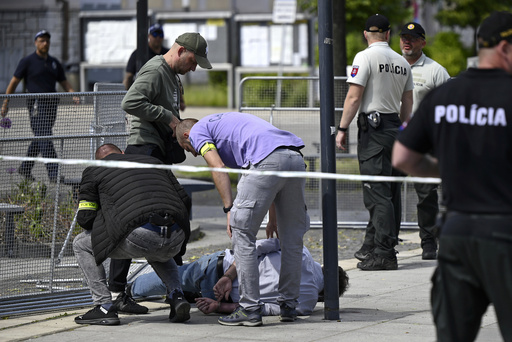BANSKA BYSTRICA, Slovakia (AP) — Slovak Prime Minister Robert Fico was in serious but stable condition Thursday, a hospital official said, after the populist leader was shot multiple times in an assassination attempt that shook the small country and reverberated across the continent weeks before European elections.
A suspect was in custody, and Interior Minister Matus Sutaj Estok said Wednesday that an initial investigation found “a clear political motivation” behind the attack on Fico while he was attending a government meeting in a former coal mining town.
The minister did not specify what the motivation was. Fico has long been a divisive figure in Slovakia and beyond, and his return to power last year on a pro-Russian, anti-American message led to even greater worries among fellow European Union members that he would abandon his country’s pro-Western course.
His government has already halted arms deliveries to Ukraine, and critics worry that he will lead Slovakia — a nation of 5.4 million that belongs to NATO — down a more autocratic path. Thousands have repeatedly rallied in the capital and across the country to protest Fico’s policies on Ukraine and other issues, including plans to amend the penal code to eliminate a special anti-graft prosecutor and to take control of public media.
Doctors performed a five-hour operation on Fico, who was initially reported to be in life-threatening condition, according to director of the F.D. Roosevelt Hospital in Banska Bystrica, Miriam Lapunikova. He is being treated in an intensive care unit.
Five shots were fired Wednesday outside a cultural center in the town of Handlova, nearly 140 kilometers (85 miles) northeast of the capital, government officials said.
Slovakia’s Security Council was set to meet in the capital of Bratislava on Thursday to discuss the situation, a government office said, adding that a government meeting would follow.
Fico returned to power in Slovakia last year, having previously served twice as prime minister. He and his Smer party have most often been described as left-populist, though he has also been compared to politicians on the right like the nationalist prime minister of neighboring Hungary, Viktor Orbán.
Fico’s comeback caused concern among his critics that he and his party — which had long been tainted by scandal — would lead Slovakia away from the Western mainstream. He promised a tough stance against migration and non-governmental organizations and campaigned against LGBTQ+ rights.
___
Josek and Jenne reported from Bratislava, Slovakia. Associated Press journalist Karel Janicek in Prague contributed.
Source: post





